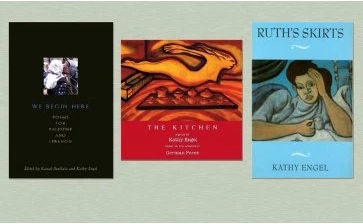Kathy Engel talks about poetry, activism and the panel on Art & Politics she will moderate at the Hobart Book Village Festival of Women Writers in September 2017.
Read a snippet below, then click through to see the whole interview.
Monday, Jun 26, 2017
Kathy Engel talks about poetry, activism and the panel on Art & Politics she will moderate at the Hobart Book Village Festival of Women Writers in September 2017.
Read a snippet below, then click through to see the whole interview.

SN: You teach a class called “Language as Action” at NYU and former Hobart Festival of Women Writers workshop instructor and writer, Alexis De Veaux has said your book Ruth’s Skirts “exposes the artificiality of the borders between poetry and prose, between poet and activist.” Though you could surely write an entire book on the topic, can you give us a small taste of your relationship between language and activism—specifically, why do you turn to poetry, to the crafting of beautiful words, to speak on weighty matters of the world?
KE: Stephanie, I have no choice. I live in the lusciousness, power and danger of words, commas, dashes, line breaks, and also pauses and erasures, the stutters and struggles of the birth and death of language — even as I embrace silences, or quiet spaces between words. Poetry works through the poet I think. Although there have been numerous times when, as an activist or organizer, I’ve felt divided, that my poem self wasn’t fully welcomed at the table of political movement, it is poetry where I feel most myself, and therefore most able to give and offer something useful for transformation. Language can reveal or conceal. Those who abuse power conceal, distort, and manipulate with language. We know our language is at risk. And that the idea of any truths are at risk. The job of the poet is, in part, to go to the deepest, most challenging, most contested places with language, to dare, to translate, to reveal. Through our lyric, our narrative, our complicated and connected, we have the possibility of revealing the universal. We have to believe the language is alive, that we can claim, name, re-name, and articulate not only resistances but dreams. As organizers and diplomats we must often self censor. As writers we must “kill the censor” as one of my mentors always says. Read More...